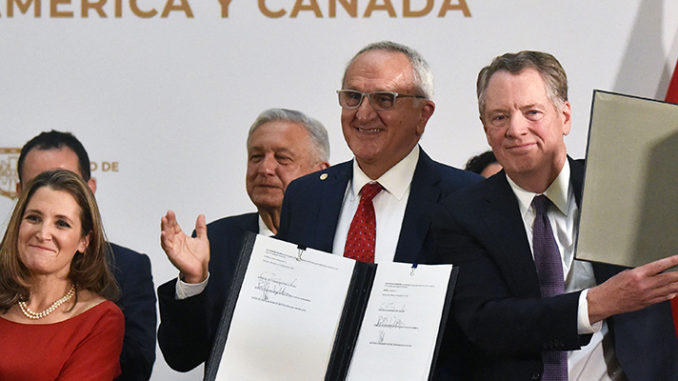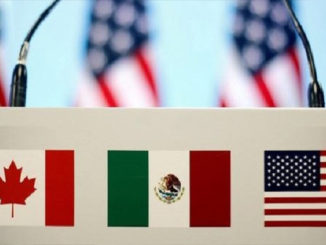
by Jack Caporal
On December 10, following months of negotiations with House Democrats, the Trump administration signed a revised United States-Mexico-Canada Agreement (USMCA), one year after the trade deal was initially signed to replace the North American Free Trade Agreement, or NAFTA.
Q1: Didn’t the United States, Mexico, and Canada already have a deal? Why was a renegotiation necessary?
A1: Negotiations for the USMCA initially concluded on September 30, 2018, and the deal was signed by President Trump, Canadian prime minister Justin Trudeau, and then-Mexican president Enrique Peña Nieto on December 1, 2018. However, Democrats, following their takeover of the House in the 2018 midterm elections, made clear that the USMCA would require changes in order for it to pass. Democrats raised concerns over four areas of the agreement: labor provisions, enforcement, protections for brand-name biologic drugs, and environmental provisions. The Trump administration and House Democrats negotiated over what specific modifications would be necessary for Democratic support. Subsequently, the administration reentered negotiations with Mexico and Canada over the proposed changes. An amended deal was signed on December 10.
Modification of trade agreements after signature is not uncommon. Half of the 12 most recent trade agreements brought into force by the United States were modified after their initial signature, according to a CSIS analysis. Compared to those six agreements, the revisions to USMCA post-initial signature took a relatively short period of time.
Q2: What changed between the initial version of the USMCA and the new one?
A2: According to House Democrats, modifications have been made in each of their four priority areas. The modifications generally reflect Democrats’ objectives.
Enforcement: On enforcement, a loophole that allowed respondents to block the formation of state-to-state dispute settlement panels has been closed. In other words, state-to-state dispute settlement panels must now be established once requested.
Labor: Democrats have consistently complained that the inability to adequately enforce labor obligations in trade agreements makes them nearly worthless. Several important, first-of-their-kind amendments on labor were agreed to that aim to address that complaint. Overall, the amendments improve the ability to monitor compliance with labor obligations and successfully bring formal dispute settlement cases over suspected violations of labor obligations.
Changes to the USMCA resolve a concern stemming from a dispute the United States lost over alleged labor violations in Guatemala under the Dominican Republic-Central America Free Trade Agreement. In that case, the United States failed to prove that Guatemala’s failure to live up to its obligations impacted trade. The USMCA has been amended to flip the burden of proof—under the USMCA, labor violations will be presumed to affect trade and investment, and the burden of proving otherwise will fall onto the responding government.
The parties agreed to a labor-specific enforcement mechanism that goes beyond dispute settlement rules in previous trade agreements. The new mechanism allows for enforcement on a facility level, verification of compliance by independent labor experts, and can result in penalties on goods and services produced in breach of freedom of association and collective bargaining obligations. The ability to inspect specific facilities was a key ask of Democrats and a demand that Mexico had initially balked at.
Amendments were also made to enhance monitoring of Mexico’s compliance with its labor obligations. The addition of benchmarks to measure Mexico’s implementation of labor reforms is a significant addition to the USMCA. Failure by Mexico to meet benchmarks will lead to enforcement under the agreement. Another significant addition to the labor chapter is the creation of labor attachés based in Mexico to monitor compliance.
Pharmaceuticals: Rules that slowed the entry of generic pharmaceuticals into the market have been eliminated or amended. Significantly, language providing 10 years of market exclusivity for biologic drugs, an advanced drug manufactured in a living system (traditional drugs are usually manufactured through chemical synthesis), has been removed. While the United States currently maintains 12 years of exclusivity for biologics, Democrats were concerned that requiring 10 years of protection in the USMCA would prevent Congress from lowering the market exclusivity period further.
Environment: Two major changes have been made to the environmental obligations in the USMCA. First, just as in the labor changes, in dispute settlement over environmental issues, the operating presumption is that violations do affect trade and investment. Second, the United States, Canada, and Mexico have agreed to adopt, implement, and maintain a set of seven multilateral environment agreements—an obligation in line with previous U.S. free trade agreements. This obligation makes those agreements enforceable under the USMCA dispute settlement, with the possibility of withdrawal of trade concessions as a penalty for non-compliance. Democrats and the White House have also agreed on upgraded monitoring of compliance with environmental obligations, including via the creation of attachés stationed in Mexico City to monitory Mexico’s compliance.
Q3: What do these changes mean for U.S. trade policy?
A3: Democrats and U.S. Trade Representative Robert Lighthizer have described the new USMCA as a “template” for future U.S. trade agreements. The amendments to the USMCA along with numerous departures from previous trade agreements in the original USMCA mark a significant shift in U.S. trade policy. From the outset of the negotiations, Lighthizer’s goal was to craft an agreement that would attract bipartisan backing and support from labor and business stakeholders. Some of the novel provisions in the USMCA reflect that goal. Notably, this is the first trade agreement the AFL-CIO has backed in almost two decades, which confirms a worker-friendly tilt in the substance of the modifications. That said, not all parts of the labor movement are satisfied with the agreement. The International Association of Machinists, for example, has said the updated deal still falls short on labor and enforcement.
In some respects, the new USMCA suggests the United States intends to maintain domestic policy space in certain areas, such as drug pricing and dealing with investor-state disputes. However, in other areas, the United States has become more assertive vis-à-vis its trading partners. This is reflected in more robust enforcement, particularly in the areas of labor and the environment, as well as stringent automotive rules of origin and the inclusion of a clause that allows two USMCA parties to terminate the agreement with the third party and enter into their own bilateral accord if the third party enters into a free trade agreement with a non-market country.
Aside from the push and pull over sovereignty and exerting influence on its trading partners, the USMCA also suggests the United States is mindful of the need to include provisions in trade agreements that set the rules for the twenty-first century economy. Gold-standard digital trade rules, the inclusion of enforceable current obligations in the core agreement, and robust rules on state-owned enterprises are welcome inclusions in the new U.S. free trade agreement template.
Q4: What is next in the legislative process for the USMCA?
A4: The House leadership has stated it intends to vote on the USMCA before the end of the year, and bipartisan support for it is expected. The Senate, however, is a different story. Majority Leader Mitch McConnell (R-KY) has stated that the USMCA will not be considered in the Senate in 2019 and that it likely will not come to a vote before the conclusion of the expected impeachment trial. Regardless, it is unlikely that McConnell will hold the USMCA hostage for an extended period. Congressional consideration of trade agreements is subject to rules that require the Senate to eventually vote on the agreement, and McConnell has little incentive to hold up a trade win for the president heading into the election season.
Procedurally, the administration has teed up the USMCA for swift passage in Congress. The rules and procedures for negotiation and passage of trade agreements are set out in the 2015 Trade Promotion Authority (TPA) law. The TPA requires the administration to take a series of steps before it formally submits a bill to implement a trade agreement to Congress. Given that those steps, such as a study of the agreement’s economic impact and a report on changes required to U.S. law to implement the agreement, have already been completed, the administration is free to submit implementing legislation to the House whenever it wants. The TPA also requires the House and Senate to vote on implementing legislation within 90 session days of its introduction. Mock markups of a draft implementing bill may be held in the House Ways and Means and Senate Finance Committees prior to the introduction of the final implementing legislation; however, they are not required.
Once the implementing legislation is introduced, the House Ways and Means Committee must vote on the implementing legislation within 45 session days. The full House must vote on the legislation with 15 days of the committee vote. Following House consideration, the Senate Finance Committee is provided 15 session days to vote on the bill, and the full Senate is provided 15 session days to vote following the Finance Committee’s vote. In total, the House must vote on the agreement within 60 days and the Senate within 30. Further, the House and Senate can act concurrently to accelerate the process. Once the implementing legislation has passed both chambers, the president may sign it into law and make necessary proclamations to implement the agreement.
This is part IV of our series on the USMCA and its domestic path to ratification by Congress. Read part I, part II, and part III to get fully up to speed on the USMCA.
Jack Caporal is an associate fellow with the Scholl Chair in International Business at the Center for Strategic and International Studies (CSIS) in Washington, D.C.



